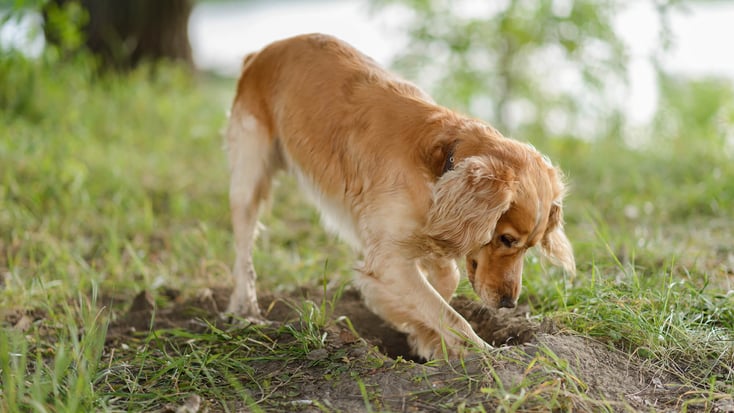How to Stop a Dog From Digging: 4 Tips & Tricks

Table of Contents
Is your dog's digging wreaking havoc in your yard? Don't worry, we've got you covered! In this article, we'll reveal the reasons behind this behavior and share practical tips and tricks to stop your dog from digging.
Key Takeaways:
- Dog's dig due to survival instinct, boredom, seeking comfort, and stashing treasures.
- Create designated digging areas to redirect their digging instincts and make unwanted digging spots less appealing.
- Use positive reinforcement training and regular exercise to discourage digging and strengthen the bond with your dog. Avoid punishments and seek professional advice if needed.
Why Do Dogs Like to Dig?
Dogs love digging due to their natural instincts and behaviors, such as their survival instinct, seeking stimulation or fun, finding comfort, and stashing treasures. Here are explanations of each common reason:
Survival instinct
Dogs love digging up yards due to their natural instincts and behaviors from their wild ancestors. It served as a survival skill for hunting, sheltering, and raising pups.
Boredom and stimulation
Nowadays, your dog might dig out of boredom or for mental stimulation. Just like us, dogs can get restless, and digging becomes their way of having fun. Ensure your dog gets plenty of exercise and playtime to help with this!
Seeking comfort
Have you ever noticed your dog digging a cozy spot in the yard? They might be seeking comfort or creating a den-like space. This is completely normal, and providing them with a comfy, designated area indoors can reduce their urge to dig outside.
Stashing treasures
And here's the cute one – dogs often dig to stash away their treasures! Just like squirrels hoard nuts, our pups bury their favorite toys or bones. It's their way of keeping them safe and harkens back to their ancestors' resourceful habits.
How to Stop a Dog From Digging
To stop a dog from digging, create designated digging areas, discourage unwanted digging spots, provide regular exercise and playtime, and use positive reinforcement training. Here’s a breakdown of these effective tips:
1. Designated digging areas
Offer your pup an appropriate outlet for their digging instincts by creating a designated digging spot or a sandbox in your yard. Encourage them to dig in this specific area, which will divert their attention from other places you'd like to keep pristine.
2. Modify the environment
Make the areas you don't want your dog to dig in less appealing. Cover or fence off garden beds to deter their digging ventures. You can also place rocks or other obstacles in those areas, which will discourage them from exploring those spots.
3. Regular exercise and mental stimulation
Keep your dog physically and mentally engaged by providing regular exercise and playtime.
A tired dog is less likely to dig out of boredom or excess energy.
4. Positive reinforcement training
Use positive reinforcement techniques to redirect your dog's behavior. Whenever you catch them digging in the designated area or refraining from digging where they shouldn't praise and reward them. Positive reinforcement helps solidify the desired actions.
Remember to establish boundaries and be consistent in your training efforts. Dogs thrive on routine, so consistent reinforcement of the rules will help them understand what is expected of them.
Also, consider the emotional aspect of digging behavior. Anxiety or stress could be contributing factors. If you notice signs of anxiety, address these underlying emotional factors through various means, such as creating a calm environment, engaging in bonding activities, or scheduling a vet visit if necessary.
Should My Pet Be Seen by a Veterinarian?
1. Have you noticed changes in your pet’s appetite?
2. Does your pet have diarrhea or loose stools?
3. Have you noticed changes in your pet’s thirst/water consumption?
4. Is your pet having accidents in the house?
5. Is your pet pacing and unable to settle?
6. Is your pet panting more than usual?
7. Is your pet whining or vocalizing more than usual?
8. Is your pet shaking more than usual?
9. Is your pet hiding or avoiding physical contact more than usual?
10. Is your pet more lethargic and sleeping more than usual?
11. Are you concerned about changes in your pet’s behavior?
12. Is your pet scratching their ears?
13. Is your pet licking their paws more than usual?
14. Does your pet have a rash?
15. Is your pet moving more slowly than usual or having a harder time getting up or down?
View Results
Should My Pet Be Seen by a Veterinarian?
1. Have you noticed changes in your pet’s appetite?
2. Does your pet have diarrhea or loose stools?
3. Have you noticed changes in your pet’s thirst/water consumption?
4. Is your pet having accidents in the house?
5. Is your pet pacing and unable to settle?
6. Is your pet panting more than usual?
7. Is your pet whining or vocalizing more than usual?
8. Is your pet shaking more than usual?
9. Is your pet hiding or avoiding physical contact more than usual?
10. Is your pet more lethargic and sleeping more than usual?
11. Are you concerned about changes in your pet’s behavior?
12. Is your pet scratching their ears?
13. Is your pet licking their paws more than usual?
14. Does your pet have a rash?
15. Is your pet moving more slowly than usual or having a harder time getting up or down?
Share Quiz
What Not to Do
When it comes to stopping your dog's digging habits, avoid a few things that can make things worse:
1. Don't punish or scold
It can make them scared or anxious, and they might become more destructive. Instead of understanding why they dig, they'll just fear you. Punishments can inadvertently give attention to the behavior, which may encourage further digging.
2. Don't ignore the digging problem
Your dog might be trying to tell you something or seeking attention. Ignoring it won't make it go away, and they might dig more to get noticed.
3. Don't fill the holes with enticing stuff
Avoid filling the holes with things your dog finds appealing, as this may encourage them to dig even more.
The key is positive reinforcement and redirecting their behavior. Understand why they dig and use positive training to guide them to better spots for digging or other fun activities. This way, you can build a strong bond and help them kick that digging habit!
Conclusion
To stop your dog from digging, it's essential to understand the reasons behind their behavior (pun intended!). Positive reinforcement techniques and redirecting their energy will help guide them in the right direction. Remember, be patient and consistent, and avoid punishments. And if you find yourself struggling, don't hesitate to seek a behavioral consultation for your dog.
Frequently Asked Questions
What smell keeps dogs from digging?
Citrus, citronella, and vinegar are common scents that many dogs find unpleasant and can deter them from digging.
Do dogs grow out of digging?
As they age, and with proper training and attention to their needs, dogs may naturally outgrow the excessive digging behavior.






